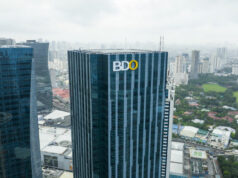Duterte advises caution anew on maritime dispute
PRESIDENT Rodrigo R. Duterte expressed caution anew about taking up the Philippines’ maritime dispute with China over the South China Sea.
But at the same time, he said he did bring up that matter with Chinese counterpart Xi Jinping, as confirmed by China’s official Xinhua news agency.
“China will continue to work with ASEAN (Association of Southeast Asian Nations) countries to safeguard peace, stability and prosperity of the South China Sea region,” Xinhua cited Mr. Xi as saying to Mr. Duterte.
Mr. Duterte for his part said in his homecoming remarks on Sunday, Nov. 12, that he and Mr. Xi “discussed the South China Sea.”
Mr. Duterte said Mr. Xi “was quite surprised about my coming in very strong (on) my statement here about the conduct of the sea.”
“I said, ‘I am not raising any sovereign issue. Do not worry.’ But as Chairman, I was made it — the, you know, a tunnel for the communications to be active,” Mr. Duterte also said, adding further:
“And I said, ‘I had to do it because the Philippines chairs the ASEAN now’….I cannot escape that from my duty….But I explained it to him in a very nice way that it was all — that was all the rest of it.
According to Mr. Duterte, Mr. Xi, in response, “assured us again, ‘Do not worry. You have all the rights of the safe passage.’”
Mr. Duterte, however, also noted: “If you go to the negotiating table and you start with the statement ‘that I am here to claim validity of our ownership,’ you’re wasting your time. They will not talk about it.”
“And, you know, we are almost fined-tuned to the realities of the moment. But there will always be a time, I said, that we have to talk about this. The Philippines and China minus everybody.”
He acknowledged the efforts of the previous administration to bring China to the arbitration court in The Hague, which led to a ruling last year in the Philippines’ favor. “Tama ‘yung ginawa ni Aquino. No doubt about it. Tama si Carpio.” ([Then President Benigno S.C.] Aquino [III] did the right thing. [Supreme Court Senior Associate Justice Antonio T.] Carpio, [a leading advocate for Philippine sovereignty in the maritime dispute,] was right.)
“But what will happen if they would also start filing cases now before the arbitration as against the any number of countries, the five or six remaining?” Mr. Duterte also said, adding:
“You think we can handle it? And if we win, still, can we enforce it?”
“Third is maybe make the issue, but are we prepared to go to war?”
“That’s the — we never surrendered anything. Just say, I do not want to talk about this for the moment. It is not time for aggression, it is not time for violence.”
“We have so many problems, domestic, to take care of before we start to venture on some sort of an aggressive stand.”
Addressing the ASEAN Business and Investment Summit on Sunday, Mr. Duterte also noted
“China is the number one economic power and we have to be friends, (while) the other hot heads would like us to confront China and the rest of the world on so many issues.”
“The South China Sea is better left untouched.”
NORTH KOREA
Sought for comment, Herman Joseph S. Kraft, associate professor at the University of the Philippines Department of Political Science, said of the anticipated efforts at ASEAN to tackle the South China Sea, “If it’s going to be a joint communiqué, you’re going to have a problem convincing the other ASEAN countries to agree to (a strong) statement. I’m not so sure if the Philippines is willing to come out with a statement that is only of the chairman.”
The professor further cited that failing to reach a consensus on this matter may lead to a similar situation in Phnom Penh, Cambodia, when the ASEAN held its summit there in 2012 and failed to come up with a joint communiqué.
In line with this, Mr. Kraft said a statement from the ASEAN regarding North Korea may not hold much credibility.
“If ASEAN cannot issue a statement on or cannot agree with a statement regarding South China Sea, even if there would be consensus on North Korea, the statement wouldn’t be too credible because you’re commenting on an issue that is far from you but cannot say anything on an issue closer to home,” he said.
Also sought for comment, Department of Foreign Affairs spokesperson Robespierre L. Bolivar acknowledged North Korea as a “second thematic priority” following the “first (being) we want a people-centered, people-oriented ASEAN.”
“That’s why we issued a statement of concern, for instance, if North Korea undertakes nuclear testing, these types of security issues,” Mr. Bolivar said.
He also noted that we are “fast-tracking the framework of the Code of Conduct adopted last August. So hopefully, the ASEAN-China summit on Nov. 13 will announce the start of the negotiations on the Code of Conduct.” — Rosemarie A. Zamora with Minde Nyl R. dela Cruz and Reuters



